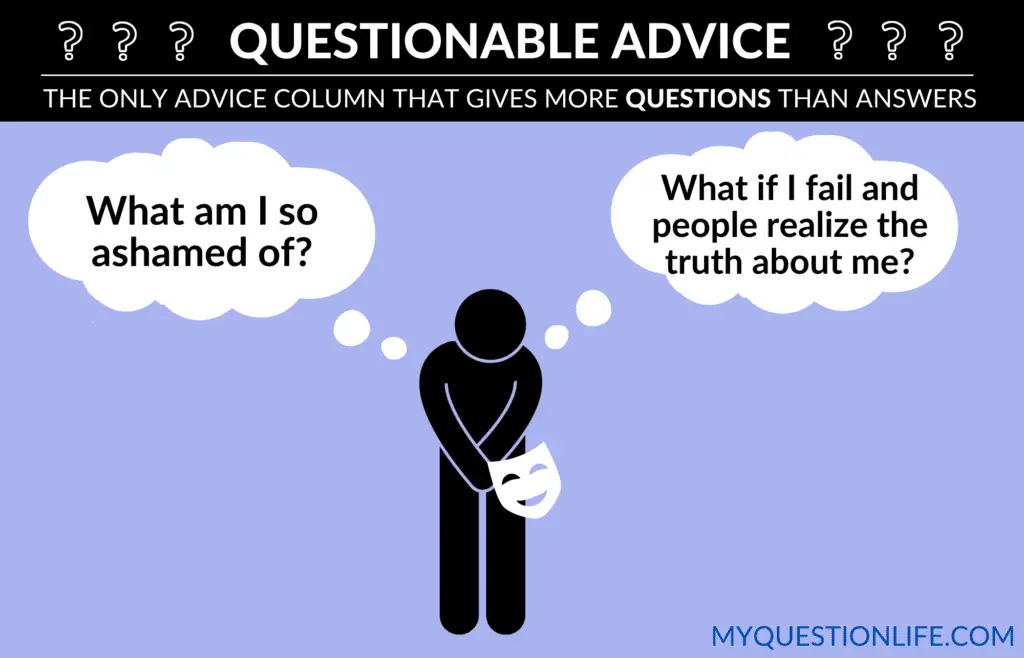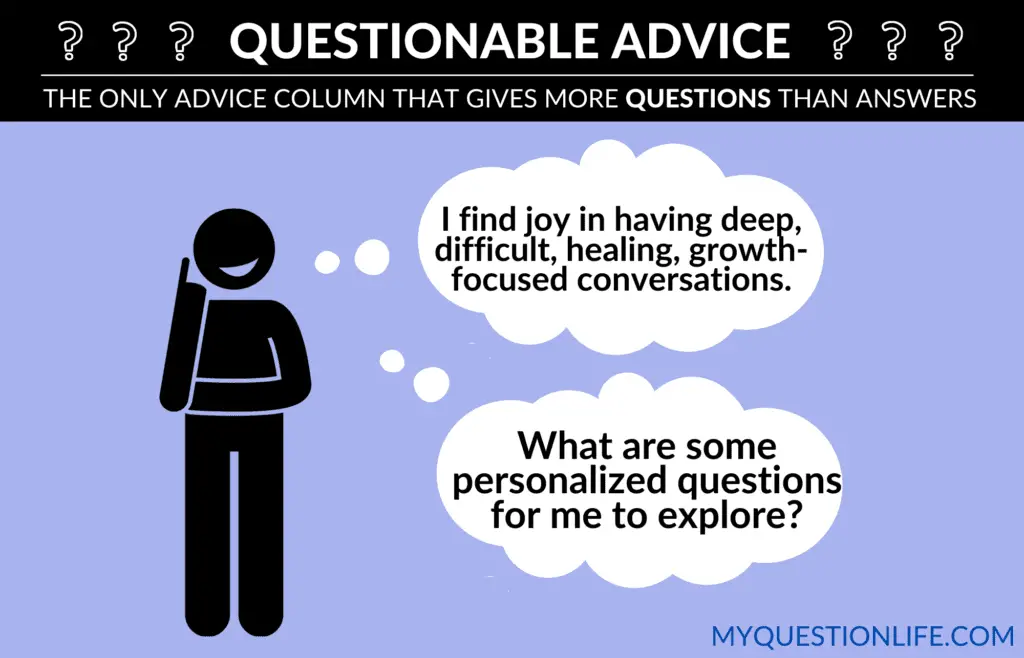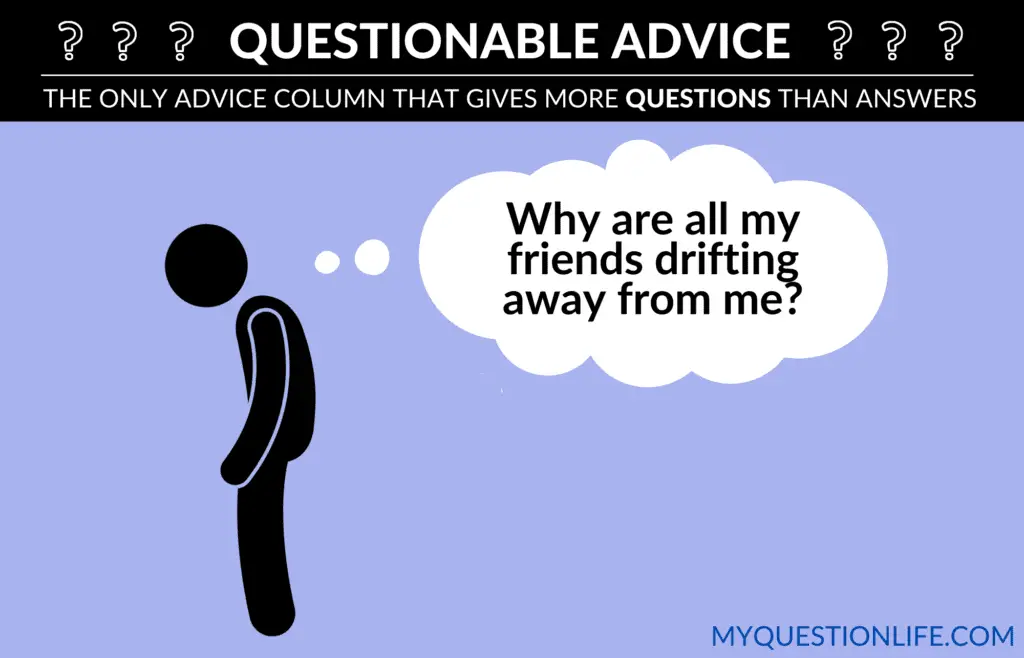Questionable Advice #9: What am I so ashamed of?
The only advice column that gives you more questions than answers.
Hi Kara,
Nice to meet you.I don’t know if you really expected a response when you asked those questions within this email, or if you will reply, but here goes nothing. My Name is Ellie and I’m a 35-year-old single mom from a small Island republic in the Caribbean.
I was reading a blog article you wrote last night because I have been on a journey of self discovery, healing and self awareness in the last few years (self awareness being a recent skill I discovered or rather understood in 2021) and as I continue to grow and develop, sometimes I google random things for a better understanding.
I saved your article “How to Be True to Yourself: The Hidden Truth We Need to Embrace” on December 15th when I did a google search on authenticity. Authenticity has become a big part of my life of late because for many years I lived outside of who I felt I was because I was never comfortable being myself and I wanted everyone to believe I had it all together. I came back to it last night, (to read) because I have been trying to get some personal goals underway that requires me to be attuned to some things about me. In reading the article I went through at the end and clicked every live link their was available, because the content was intriguing, and as one of my goals is to read 15-30 minutes daily for my own personal development, I found these to be a perfect fit.
I struggle with the fear of failing the most. It has inhibited me from even trying and has scared me into a life of settling. The fear of not being universally accepted or successful on the first try mortifies me. I think people will laugh at me when I fail because I believe myself to be intelligent and others have told me the same. I grew up hearing about how bright and brilliant I was and yet I live a very limited life because I like to operate in my comfort zone as a mechanism to avoid failure. I’m so ashamed of being thought of as a failure or unintelligent, I don’t even attempt anything because… what if I fail and people figure out I’m not smart?
I would want you to tell me if I would succeed at anything in the end, if I would ever overcome this fear and realize my true potential.
I have been physically separated from my soon to be ex-husband for the past two years , January will make it 2 full years of physical separation and we have our first court hearing soon. I am in the process of using my voice (this is what I feel gives me the most purpose) to start a podcast and tell my story as I believe this is what I’m being called to do. This podcast has been a long time in the making, but again, the fear of failing and what others think has crippled me. I just have a name and introduction for now, I know what I want it to be about, however, I haven’t begun recording yet, because I don’t know what I want to say or how to start my story… This is why I have been seeking to learn more about myself so I can feel the most comfortable sharing my story with others.
What am I so ashamed of?
Hi Ellie,
First and foremost, that you for showing the courage to share your thoughts and story with me. Voicing our fears to other people – even through email – is sometimes the bravest thing we can do. I’m sorry my reply is so delayed; I know this advice is coming after your first court hearing, but I can just wishfully hope that the timing is fortuitous with what you need to hear right now.
People constantly commented on how thin I was when I was growing up. I heard You’re so skinny! You need to eat more; you’re so thin. It looks like your arms could snap in half. (Whenever I reflect on the last one, I’m always startled a bit by its violent nature). They weren’t lying; I was naturally thin and athletic. But I didn’t realize how deep their words sunk in until I was fresh out of college, extremely vulnerable with who I would be in this next stage of my life, and–to my horror–ten pounds heavier than I’d ever been before.
Ten pounds sounds minuscule, but the number didn’t matter as much as my perception of what that number meant. If I wasn’t thin, what was I? Who was I?
It wasn’t until several years later, after a stretch of highly disordered eating I didn’t even realize, that I began to unpack what happened in therapy. At some point along my childhood, I adopted “being thin” as a pivotal piece of my identity. And, subsequently, as a defining characteristic of my self-worth.
People innocently throw words at us when we’re children; we don’t realize how dangerous they become in building our self-perception.
Words like “thin” and “intelligent,” even intended as compliments, build into labels that box us into who we think we need to be. Eventually, we take others’ words and make them our own labels. And then, ironically, look back to others to judge if we’re meeting these labels. The more you focus on it as a defining characteristic, the smaller the box becomes.
Unfortunately, the smaller our life becomes, as well.
It’s terrifying to confront the truth that we might not be the person we thought we should be. Shame and fear threaten to consume us.
You might be surprised by this, Ellie, but I think in this area you might be a step further than you think. You admit that “for many years I lived outside of who I felt I was.” You understand that who you are is different from how you’re trying to allow other people to see you. Brava! Many people are stuck in the box without realizing they’re in a box. You’ve knowingly labeled your metaphorical box “Intelligent person who doesn’t fail,” and you’re just choosing to camp inside it still.
Popping open those box lids and facing rejection is terrifying. Because, as you rightly acknowledge, it taps into our innate need for belonging. As you say, the fear of “not being universally accepted.”
But here’s the thing about the science-proven fear. Yes, in evolutionary times, social belonging necessitated survival. But–and I think this will be an important distinction for you as well–this social belonging was not universal. Humans relied on their small communities to coexist with; therefore, they had to be accepted in these groups.
We don’t need to be accepted universally by everyone.
Who is your group? Who do you trust to care enough about what they think of you? How can you begin to tap into their opinions more, and in doing so, begin to dissipate this imagined “everyone out here” opinion of you?
I imagine your child will be one of those people that you care about what they think. I’d also bet that you wouldn’t wish many of your own struggles with authenticity, shame, and fear on them. But here’s the thing about kids–they’re perceptive little buggers. You can tell them until you’re blue in the face about how to live a courageous life, but what will be more powerful is for you to show them a model for the life you want to live. Not a perfect, failure-free model (they’ll see through that, too). A true one: messy, flawed, trying and failing, and growing every step of the way.
You litter your email with self-aware, insightful questions. You’re so far ahead of many people in this regard, Ellie, that you should feel proud of all the inner work and reflection you’ve done.
- What if I fail and people figure out I’m not smart?
- What if I attempt a podcast and it fails?
- What if people judge me for making a podcast? (Or doing anything else in my life, for that matter?)
But you’re missing the final step: answering them. I want you to sit down with a pen and paper and actually answer these questions. Go into detail. Put it all on the paper. And while I can’t speak to the specifics, I can assure you of three things:
- You will survive.
- You will step further out of the box and into who you are.
- You will begin to reshape your definition of failure, success, and intelligence.
This might sound harsh, Ellie, and I hope it doesn’t come across as such. Intelligence is not hiding your true self, living in a box, and knowing a better way but letting fear hold you back. Intelligence is redefining failure for yourself and for others. It’s realizing that to fail is to grow–which really is to succeed. It’s understanding that a fearful life is a boring one, shame is not insurmountable, and it’s never too late to step into your own light.
Disregard what unimportant people say about you (and hell, some of them probably already talk about you, anyway). Redefine what you think an intelligent life looks like. Practice failing at small things and feeling awkward, everyday, just to prove to yourself that you can survive it.
And, because there’s a story inside of you screaming to get out, do the podcast. Even if nobody listens, and you don’t get it perfect, and you meander your way through personal stories in a way that’s tough to follow. Do it because vulnerability and authenticity are the most empowering things that resonate with others. Do it because you want to, and that’s enough.
None of this is easy, mind you. Precisely for this reason, it’s crucially important.
But you already know all of this. Because you’re writing the email, doing the research, and asking all the right questions. Questions like, What would happen if I’m not afraid of failure?
Now all you need to do is answer them.
And when you feel those powerful clutches of fear and shame trying to hold you back, just tell yourself, “If I fail at this, it’ll make great content for my next podcast.”
Warmly,
Kara
Self-Awareness Questions to Help You Face Your Fears:
- How do you define failure? How might your definition be wrong?
- What successful people do you know who have failed? Intelligent people who have failed?
- What podcasts or books do you resonate with the most? What makes them so impactful for you?
- What would your life be like if you tried more things? What will it be like if you try more things moving forward?
- Who is your group of trusted confidants?
- What will happen if people think you’re not smart?
- What do you want for your child? How can you model that?
- What mantras can you tell yourself to ease your fear or shame?
- How might your podcast help someone else live their truth? How would that make you feel?
And of course, your questions:
- What if I fail and people figure out I’m not smart?
- What if I attempt a podcast and it fails?
- What if people judge me for making a podcast? (Or doing anything else in my life, for that matter?)
Related blog posts to read on vulnerability, overcoming fears, and self-awareness:
- Fear of Vulnerability: How to Fight Fear for a Meaningful Life
- How to Face your Fears: 7 Steps to Face Your Fears
- Why Feeling Awkward Might Be Your Superpower
- How to Be Vulnerable in your Life
- How to Get Comfortable Feeling Uncomfortable: Lean Into Discomfort
Want some of your own Questionable Advice? Send me an email or check out my FAQ on what Questionable Advice is (and why you should do it).
I’m limited by my own experiences and perspective, which is why I always feel the weight of giving advice (even if it’s questionable!) to other people. However, I want to channel this vulnerability into growth. If you think I made a mistake, believe I overstepped, or have a suggestion for a better response, please let me know. You can send me an email with the Questionable Advice post title in the subject line. I appreciate the chance to learn and grow!



